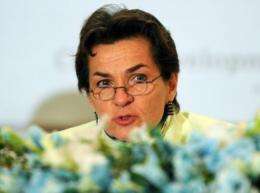UN: Canada still obliged to fight climate change

The UN climate chief on Tuesday voiced regret over Canada's withdrawal from the Kyoto Protocol and said that the country still had legal obligations to work against global warming.
Christiana Figueres, head of the UN Framework Convention on Climate Change, also expressed surprise that Canada chose to announce its decision just after more than 190 countries reached a hard-fought accord in Durban, South Africa.
"I regret that Canada has announced it will withdraw and am surprised over its timing," Figueres said in a statement.
"Whether or not Canada is a party to the Kyoto Protocol, it has a legal obligation under the Convention to reduce its emissions, and a moral obligation to itself and future generations to lead in the global effort," she said.
"Industrialized countries whose emissions have risen significantly since 1990, as is the case for Canada, remain in a weaker position to call on developing countries to limit their emissions," she said.
Canada on Monday became the first country formally to quit the landmark Kyoto Protocol as it sought to avoid paying penalties of up to CAN$14 billion (US$13.6 billion) for missing targets on cutting carbon emissions.
But Canada, like virtually all countries, remains part of the UN Framework Convention on Climate Change -- set up by the 1992 Rio Earth Summit which called in broad terms for global action against human-caused global warming.
The Kyoto Protocol, reached in 1997 after marathon talks in Japan's ancient capital, requires only wealthy nations to cut emissions blamed for climate change.
Canada joins the United States as the only major industrial nation to shun Kyoto. US president George W. Bush rejected the treaty as one of his first acts in office, calling it unfair.
"Canada is obviously a sovereign country and can make its own decision," Todd Stern, the US envoy for climate negotiations, told reporters on a conference call when asked about the move.
"The US, as you all know, is not in Kyoto, so it's not something certainly that we're going to criticize or take a position on," he said.
But Stern said he doubted the impact of Canada's decision, noting that the European Union is the only major player that has signed on to an extension of Kyoto whose obligations were scheduled to run out at the end of 2012.
The Europeans offered the new round of Kyoto pledges on emission cuts in a bid to encourage developing countries to sign on to the Durban agreement, which calls for the first climate treaty covering the whole world by 2015.
"I think Kyoto, it's fair to say, is more the past than the future," Stern said.
"If the discussion is what's going to be in a new regime that includes everybody, that's got developed and developing countries in and how that's going to get structured, I don't actually think that Canada being in or out of Kyoto is going to really have a big effect," Stern said.
A number of other countries criticized Canada including France, which called the decision "bad news for the fight against climate change," and China, which urged Canada to "face up to its responsibilities and obligations."
(c) 2011 AFP





















